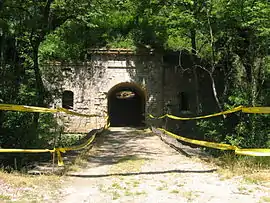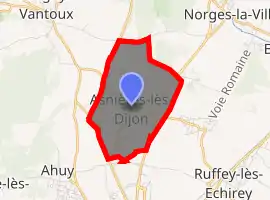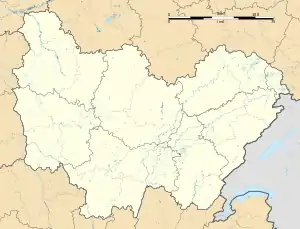Asnières-lès-Dijon
Asnières-lès-Dijon (French pronunciation: [anjɛʁ.lɛ.diʒɔ̃]) is a commune in the Côte-d'Or department in the Bourgogne-Franche-Comté region of eastern France.
Asnières-lès-Dijon | |
|---|---|
 Fort Brûlé, an old fort in Asnières-lès-Dijon commune | |
.svg.png.webp) Coat of arms | |
Location of Asnières-lès-Dijon 
| |
 Asnières-lès-Dijon  Asnières-lès-Dijon | |
| Coordinates: 47°23′09″N 5°02′44″E | |
| Country | France |
| Region | Bourgogne-Franche-Comté |
| Department | Côte-d'Or |
| Arrondissement | Dijon |
| Canton | Fontaine-lès-Dijon |
| Intercommunality | CC Norge Tille |
| Government | |
| • Mayor (2020–2026) | Patricia Gourmand |
| Area 1 | 4.55 km2 (1.76 sq mi) |
| Population (2017-01-01)[1] | 1,184 |
| • Density | 260/km2 (670/sq mi) |
| Time zone | UTC+01:00 (CET) |
| • Summer (DST) | UTC+02:00 (CEST) |
| INSEE/Postal code | 21027 /21380 |
| Elevation | 274–352 m (899–1,155 ft) (avg. 331 m or 1,086 ft) |
| 1 French Land Register data, which excludes lakes, ponds, glaciers > 1 km2 (0.386 sq mi or 247 acres) and river estuaries. | |
The inhabitants of the commune are known as Asniérois or Asniéroises.[2]
Geography
Asnières-lès-Dijon is located just 8 km north of Dijon. The commune lies between the D903 road which follows its western border from Dijon to Savigny-le-Sec and the D974 which follows the eastern border from Dijon and continues to Til-Châtel. The D104 links the two roads through the village and also continues east to Bellefond. The commune is mixed forest and farmland with a substantial urban area covering some 20% of the commune.[3]
Neighbouring communes and villages
History
After the defeat of France in 1870-1871, Dijon was chosen with Langres, Besançon, Reims, Laon, and La Fère to be a "second line" of the Séré de Rivières system of defence (the first line being focused on Verdun, Toul, Epinal, and Belfort). A series of forts and military redoubts centred on Dijon city were built from 1875 to 1883: la Motte-Giron, Mont-Afrique, Hauteville, Asnières, Norges, Var, Saint-Apollinaire, and Sennecey-lès-Dijon.
Built between 1876 and 1877, Fort Brûlé had the honour of suffering the first armed clash with Prussia.
Fort Brûlé did not defend Dijon during the two world wars. It was the Germans who used it as a storehouse for ammunition during the Second World War. These caused considerable damage in 1944 when the Germans blew up ammunition in the fort: so much so that with the exception of the protruding buttress on Saliant II, there is virtually nothing left of the left half of the fort.
The fort is now the property of a private owner.
The commune has had a very high level of population growth since the 1970s when it was a peaceful farming village. Many employees from the CEA at Valduc came to live there. The population of the commune increased six times in 40 years.
Heraldry
.svg.png.webp) Arms of Asnières-lès-Dijon |
Blazon: Azure, an ear of wheat and a bunch of grapes, stalked and leaved all in Or, isuuant from a crescent of Argent; in chief Gules charged with a crosslet bottony of Or. |
Administration
List of Successive Mayors[4]
| From | To | Name | Party | Position |
|---|---|---|---|---|
| 2001 | 2020 | Patricia Gourmand |
(Not all data is known)
Demography
In 2017 the commune had 1,184 inhabitants.
|
| ||||||||||||||||||||||||||||||||||||||||||||||||||||||||||||||||||||||||||||||||||||||||||||||||||||||||||||||||||
| Source: EHESS[5] and INSEE[6] | |||||||||||||||||||||||||||||||||||||||||||||||||||||||||||||||||||||||||||||||||||||||||||||||||||||||||||||||||||
The commune is part of the community of communes Norge et Tille.
Culture and heritage
Civil heritage
The commune has two sites which are registered as historical monuments. These are:
 The Tunnel.
The Tunnel. The Entrance.
The Entrance. The collapsed part.
The collapsed part.
Religious heritage
- The Parish Church of Saint-Alban contains one item registered as a historical object:
- Eucharistic tower (14th century)
 [9]
[9]
- Eucharistic tower (14th century)
- The Parish Church of the Nativity contains several items which have been registered as historical objects:
Facilities
Asnières has shops (bakery, butcher, a small hall, and a petting zoo) and various facilities including a hall and sports grounds (tennis, football, basketball, rugby). The town also has a nursery and primary school.
It also has a Judo club - the Entente Judo Messigny-et-Vantoux - Val de Norge (Ejmn)[16]
See also
References
- "Populations légales 2017". INSEE. Retrieved 6 January 2020.
- Inhabitants of Côte-d'Or (in French)
- Google Maps
- List of Mayors of France (in French)
- Données Cassini, EHESS
- Population en historique depuis 1968, INSEE
- Ministry of Culture, Mérimée PA21000033 Fort Brûlé (in French)
- Ministry of Culture, Mérimée PA00112069 Cemetery (in French)
- Ministry of Culture, Palissy PM21000076 Eucharistic tower (in French)
- Ministry of Culture, Palissy PM21000082 Painting: Sainte-Famille and his family (in French)
- Ministry of Culture, Palissy PM21000081 Statue: Saint Claude (in French)
- Ministry of Culture, Palissy PM21000080 Statue: Saint Abdon (in French)
- Ministry of Culture, Palissy PM21000079 Group sculpture: Virgin of pity (in French)
- Ministry of Culture, Palissy PM21000078 Retable: Apostolic cortege (in French)
- Ministry of Culture, Palissy PM21000077 Statue: Virgin and child (in French)
- Judo club website (in French)
External links
- Asnières-les-Dijon on the Val-de-Norge website (in French)
- Asnières-lès-Dijon on the old IGN website (in French)
- Asnières-lès-Dijon on Géoportail, National Geographic Institute (IGN) website (in French)
- Asnieres on the 1750 Cassini Map
| Wikimedia Commons has media related to Asnières-lès-Dijon. |